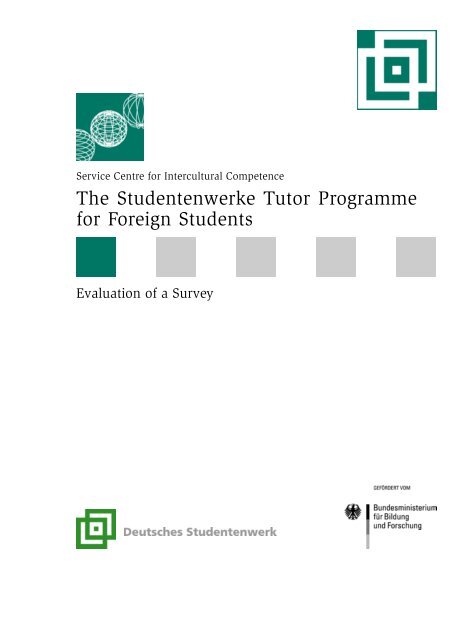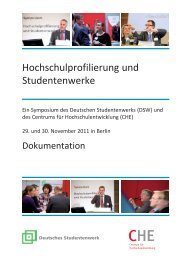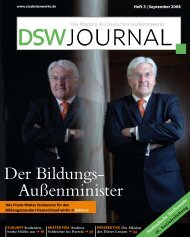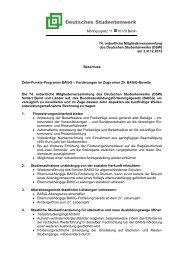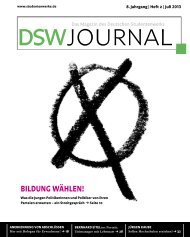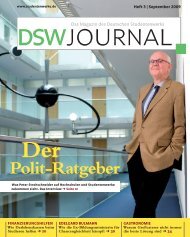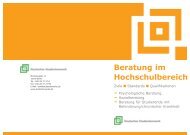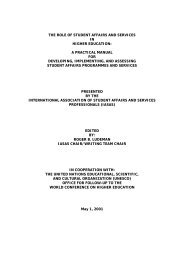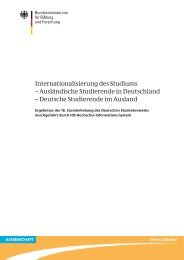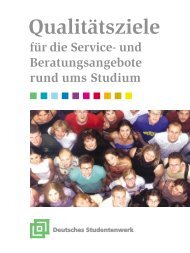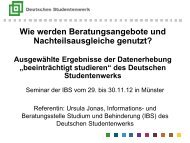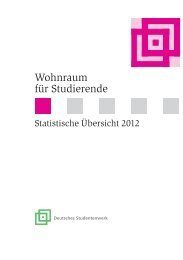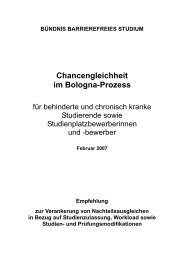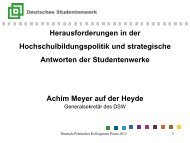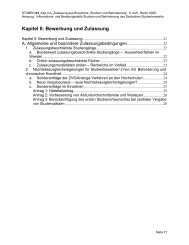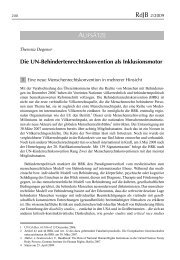The Studentenwerke Tutor Programme for Foreign Students
The Studentenwerke Tutor Programme for Foreign Students
The Studentenwerke Tutor Programme for Foreign Students
Create successful ePaper yourself
Turn your PDF publications into a flip-book with our unique Google optimized e-Paper software.
Service Centre <strong>for</strong> Intercultural Competence<br />
<strong>The</strong> <strong>Studentenwerke</strong> <strong>Tutor</strong> <strong>Programme</strong><br />
<strong>for</strong> <strong>Foreign</strong> <strong>Students</strong><br />
Evaluation of a Survey
<strong>The</strong> <strong>Studentenwerke</strong> <strong>Tutor</strong> <strong>Programme</strong><br />
<strong>for</strong> <strong>Foreign</strong> <strong>Students</strong><br />
Evaluation of a Survey<br />
<strong>The</strong> <strong>Studentenwerke</strong> <strong>Tutor</strong> <strong>Programme</strong> <strong>for</strong> <strong>Foreign</strong> <strong>Students</strong><br />
1
Published by:<br />
Deutsches Studentenwerk<br />
Monbijouplatz 11<br />
D-10178 Berlin<br />
Phone: +49 (0) 30 29 77 27 0<br />
Fax: +49 (0) 30 29 77 27 99<br />
E-mail: dsw@studentenwerke.de<br />
www.studentenwerke.de<br />
Responsible persons: Tanja Grießhammer<br />
Isabelle Kappus<br />
Translation: Lingualux Michael Keith, Berlin<br />
Overall production: Beuster Polymedia, Berlin<br />
Translation of the original publication dated July 2003<br />
Berlin, April 2004<br />
2 <strong>The</strong> <strong>Studentenwerke</strong> <strong>Tutor</strong> <strong>Programme</strong> <strong>for</strong> <strong>Foreign</strong> <strong>Students</strong>
Foreword<br />
<strong>The</strong> number of <strong>for</strong>eign students in Germany has substantially increased as<br />
a result of the international marketing campaign conducted by the federal<br />
government and the federal states in recent years. <strong>The</strong> endeavours of the<br />
institutions of higher education and the <strong>Studentenwerke</strong>, the German associations<br />
of student affairs, have considerably contributed to improving the<br />
attractiveness of Germany as a location <strong>for</strong> higher education. According to<br />
statements by “Wissenschaft Weltoffen 2003” 1 , 11.0% (206,141 persons) of<br />
all students in the winter semester 2001/02 were <strong>for</strong>eign students, of which<br />
142,786 had acquired their university entrance qualifications in a <strong>for</strong>eign<br />
country and 63,355 in Germany. This indicates a 35.7% increase in <strong>for</strong>eign<br />
students since 1997.<br />
<strong>The</strong> living conditions at the sites of the higher education institutions are of particular<br />
importance to the students from abroad. Besides influencing the conditions<br />
of studying and the personal relationship with the host country they considerably<br />
influence the perceived attractiveness of a country <strong>for</strong> studying 2 . <strong>The</strong><br />
housing situation in particular constitutes an important criterion <strong>for</strong> the evaluation<br />
of the living conditions.<br />
<strong>The</strong> internationalisation of the institutions of higher education is a new challenge<br />
that the <strong>Studentenwerke</strong> are facing. Not only does sufficient living space<br />
<strong>for</strong> <strong>for</strong>eign students have to be provided; far more, diverse in<strong>for</strong>mation, advice<br />
and support services have to be available during the course of the studies<br />
in order to contribute to a successful study visit to Germany.<br />
<strong>The</strong> tutor programmes of the <strong>Studentenwerke</strong> have become an essential ingredient<br />
of the integration measures <strong>for</strong> <strong>for</strong>eign students. <strong>Tutor</strong>s are appointed<br />
by over two thirds of the <strong>Studentenwerke</strong> and by the student residences<br />
in particular. As mediators between German and <strong>for</strong>eign students and between<br />
the <strong>Studentenwerke</strong> and other institutions they bear great responsibility.<br />
<strong>The</strong> purpose of this summary of a study that was prepared on the basis of a<br />
survey at the 61 <strong>Studentenwerke</strong> in Germany is to present an overview of the<br />
different <strong>for</strong>ms of tutor programmes offered by the <strong>Studentenwerke</strong>. Besides<br />
data on the share of <strong>for</strong>eign students at the <strong>Studentenwerke</strong> and their places<br />
of origin it presents the framework conditions of the tutor programmes and<br />
an assessment of the cooperation with the institutions of higher education in<br />
this field of work.<br />
We express our gratitude to the employees of the <strong>Studentenwerke</strong> who participated<br />
in this survey <strong>for</strong> their support.<br />
1 Wissenschaft Weltoffen 2003 - data and facts on the internationalisation of studying and research in Germany. Published<br />
by DAAD/Deutscher Akademischer Austauschdienst. Bielefeld 2003. Download at www.wissenschaft-weltoffen.de<br />
2 Compare with: Stefanie Jensen, Ausländerstudium in Deutschland: Die Attraktivität deutscher Hochschulen für ausländische<br />
Studierende (Studies <strong>for</strong> <strong>for</strong>eigners in Germany: <strong>The</strong> attractiveness of German institutions of higher education<br />
<strong>for</strong> <strong>for</strong>eign students), Wiesbaden 2001<br />
<strong>The</strong> <strong>Studentenwerke</strong> <strong>Tutor</strong> <strong>Programme</strong> <strong>for</strong> <strong>Foreign</strong> <strong>Students</strong><br />
3
Furthermore, we thank the Federal Ministry of Education and Research<br />
whose financial support finances the Service Centre <strong>for</strong> Intercultural Competence<br />
of the Deutsches Studentenwerk which is entrusted with the preparation<br />
of this publication.<br />
Achim Meyer auf der Heyde<br />
Secretary General of the Deutsches Studentenwerk<br />
4 <strong>The</strong> <strong>Studentenwerke</strong> <strong>Tutor</strong> <strong>Programme</strong> <strong>for</strong> <strong>Foreign</strong> <strong>Students</strong>
Foreword<br />
Content<br />
Content 5<br />
A. Survey data 7<br />
B. Overview of the most important results 7<br />
1. <strong>The</strong> proportion of <strong>for</strong>eign students 9<br />
1.1 <strong>The</strong> proportion of <strong>for</strong>eign students in the transinstitutional area<br />
of responsibility of the <strong>Studentenwerke</strong> 9<br />
1.2 <strong>The</strong> proportion of <strong>for</strong>eign occupants of the overall number of<br />
occupants at the residences of the <strong>Studentenwerke</strong> 9<br />
1.3 <strong>The</strong> proportion of <strong>for</strong>eign students who live in a student residence<br />
owned by the <strong>Studentenwerke</strong> 10<br />
2. <strong>The</strong> regions of origin of the occupants of the student residences<br />
owned by the <strong>Studentenwerke</strong> 11<br />
3. <strong>Tutor</strong> programmes <strong>for</strong> <strong>for</strong>eign students 12<br />
3.1 <strong>The</strong> number of tutors 13<br />
3.2 Support and services requested from the tutors 15<br />
3.3 Support of the tutors 17<br />
3.4 Evaluation of the tutors’ activity 19<br />
4. Cooperation with the institutions of higher education 20<br />
4.1 Forms of cooperation 20<br />
4.2 Suggestions to improve the cooperation 21<br />
5. Prospects of the tutor programme 22<br />
Appendix 23<br />
<strong>The</strong> <strong>Studentenwerke</strong> <strong>Tutor</strong> <strong>Programme</strong> <strong>for</strong> <strong>Foreign</strong> <strong>Students</strong><br />
5
6 <strong>The</strong> <strong>Studentenwerke</strong> <strong>Tutor</strong> <strong>Programme</strong> <strong>for</strong> <strong>Foreign</strong> <strong>Students</strong>
A. Survey data<br />
<strong>The</strong> survey on the tutor programme, the results of which this publication is<br />
based on, was developed by the Committee <strong>for</strong> International Affairs of the<br />
Deutsches Studentenwerk in mid-2002. <strong>The</strong> Service Centre <strong>for</strong> Intercultural<br />
Competence of the Deutsches Studentenwerk collected the data and evaluated<br />
the results. 53 of 62 <strong>Studentenwerke</strong> 3 have replied to the questionnaire.<br />
Nine of the <strong>Studentenwerke</strong> did not participate in the survey as they do not<br />
offer a tutor programme <strong>for</strong> <strong>for</strong>eign students. Eight of these <strong>Studentenwerke</strong><br />
subsequently submitted data on the share of <strong>for</strong>eign occupants of the student<br />
residences.<br />
<strong>The</strong> majority of this data refers to the 2002 summer semester, whereas<br />
in<strong>for</strong>mation on <strong>for</strong>eign students is not divided into persons who have completed<br />
their university entrance qualifications abroad or in Germany. In order<br />
to improve readability the masculine <strong>for</strong>m was chosen to refer to both genders.<br />
An overview of the results on the share of occupants of the student residences<br />
who are from abroad at the <strong>Studentenwerke</strong> and their region of origin as well<br />
as a list of links to the tutor programmes of the <strong>Studentenwerke</strong> can be found<br />
in the appendix.<br />
B. Overview of the most important results<br />
<strong>The</strong> first part of this publication presents the basic data on the share of <strong>for</strong>eign<br />
students in the respective transinstitutional area of responsibility of the<br />
<strong>Studentenwerke</strong> and their areas of origin. <strong>The</strong> national average of occupants<br />
of the student residences of the <strong>Studentenwerke</strong> who come from abroad is<br />
31.8%. <strong>The</strong> largest groups of <strong>for</strong>eign occupants of student residences are from<br />
China, Eastern Europe and the EU countries.<br />
<strong>The</strong> framework conditions of the tutor programmes <strong>for</strong> <strong>for</strong>eign students are presented<br />
in part two. 41 <strong>Studentenwerke</strong> offer a tutor programme; only three of<br />
them consider this programme to be sufficiently developed. Five <strong>Studentenwerke</strong><br />
were in the process of establishing such a programme at the time of questioning.<br />
This shows that the tutor programmes have become a key ingredient<br />
of the range of services <strong>for</strong> <strong>for</strong>eign students offered by the <strong>Studentenwerke</strong>.<br />
45% of the 330 tutors appointed in the summer semester of 2002 are <strong>for</strong>eigners.<br />
This impressive total number of tutors emphasizes <strong>for</strong> one thing the<br />
key function that is the duty of the tutors during the support of <strong>for</strong>eign<br />
students, and <strong>for</strong> another it explains the need <strong>for</strong> <strong>for</strong>eign students. Support<br />
3 <strong>The</strong> Studentenwerk Essen-Duisburg, which merged on 1 January 2002, has submitted two separate questionnaires. In<br />
the following, these will be included separately in the evaluation as the available experiences concerning the tutor<br />
programmes in Essen and Duisburg differ.<br />
<strong>The</strong> <strong>Studentenwerke</strong> <strong>Tutor</strong> <strong>Programme</strong> <strong>for</strong> <strong>Foreign</strong> <strong>Students</strong><br />
7
<strong>for</strong> the tutors is first of all provided by the residential offices or centres <strong>for</strong><br />
social advice of the <strong>Studentenwerke</strong>.<br />
<strong>The</strong> main issues of <strong>for</strong>eign students <strong>for</strong> which they ask tutors <strong>for</strong> help are<br />
problems with fellow occupants, help with visits to the authorities (residence<br />
permits, work permits, etc.), and contacts with German fellow students. This<br />
agrees with the results of the special evaluation of the 16 th social survey of<br />
the Deutsches Studentenwerk, “Internationalisation of Studies” 4 . <strong>The</strong> greatest<br />
difficulties experienced in Germany by <strong>for</strong>eign students who have acquired<br />
their university entrance qualifications abroad are thus in connection with the<br />
work permit and visa/residence permit application, financing of the studies,<br />
and the contact with German students.<br />
In addition, the responsibilities of the tutors are also very diverse so that<br />
a broad spectrum of personal prerequisites and faculties are required particularly<br />
intercultural and social competence, the ability to solve conflicts,<br />
creativity, and organisational skills in particular.<br />
<strong>The</strong> third and last part of this publication presents the conditions of cooperation<br />
between the <strong>Studentenwerke</strong> and the institutions of higher education <strong>for</strong><br />
recruiting and supporting <strong>for</strong>eign students. By means of a school grading scale<br />
these are rated at an average of 2.4. <strong>The</strong> prospects of the further development<br />
of the tutor programme conclude the study. Three quarters of the <strong>Studentenwerke</strong><br />
are striving <strong>for</strong> the expansion of the programme; however, the realisation<br />
is often made conditional on the financial means required.<br />
Not least, many <strong>Studentenwerke</strong> make suggestions to improve the service <strong>for</strong><br />
<strong>for</strong>eign students.<br />
<strong>The</strong> improved transinstitutional cooperation can make a decisive contribution.<br />
A proposal is made to strengthen the flow of in<strong>for</strong>mation between the <strong>Studentenwerke</strong><br />
and the institutions of higher education; <strong>for</strong> example, regarding<br />
the number of newly admitted <strong>for</strong>eign students or during the course of planning<br />
new degree courses in English. <strong>The</strong> cooperation of the <strong>Studentenwerke</strong><br />
with city councils and business enterprises, who are potential employers of<br />
students, is emphasized.<br />
However, the lack of resources is to the <strong>for</strong>e. More than the available living<br />
space capacities and additional financial means are required to be able to<br />
really secure the attractiveness of Germany as a location <strong>for</strong> higher education<br />
<strong>for</strong> <strong>for</strong>eign students. <strong>The</strong> demand can under no circumstances be met with<br />
available means, such as from the STIBET programme of the DAAD 5 . <strong>The</strong><br />
4 Internationalisierung des Studiums, Ausländische Studierende in Deutschland - Deutsche Studierende im Ausland.<br />
(Internationalisation of studies, <strong>for</strong>eign students in Germany - German students abroad). Results of the 16th social<br />
survey of the Deutsches Studentenwerk carried out by HIS Hochschul-In<strong>for</strong>mations-System. Published by the Federal<br />
Ministry of Education and Research, Bonn 2002. Download at www.studentenwerke.de<br />
5 Scholarship and support programme of the Deutsche Akademische Austauschdienst, In<strong>for</strong>mation to be found at<br />
www.daad.de<br />
8 <strong>The</strong> <strong>Studentenwerke</strong> <strong>Tutor</strong> <strong>Programme</strong> <strong>for</strong> <strong>Foreign</strong> <strong>Students</strong>
provision of sufficient resources, including by the state, is the prerequisite<br />
<strong>for</strong> the integration of the growing number of <strong>for</strong>eign students.<br />
1. <strong>The</strong> proportion of <strong>for</strong>eign students<br />
According to in<strong>for</strong>mation by “Wissenschaft Weltoffen 2003” the share of <strong>for</strong>eign<br />
students at German institutions of higher education in the winter semester<br />
2001/02 was 11.0%. Of the overall 1,868,229 students at the German institutions<br />
of higher education 206,141 were <strong>for</strong>eigners at this point in time.<br />
1.1 <strong>The</strong> proportion of <strong>for</strong>eign students in the transinstitutional<br />
area of responsibility of the <strong>Studentenwerke</strong><br />
On average, the share of <strong>for</strong>eign students of the total number of students in<br />
the summer semester 2002 in this survey was 11.6%. Within the transinstitutional<br />
area of responsibility of the <strong>Studentenwerke</strong> it varies between a maximum<br />
of 23.7% and a minimum of 4.2%.<br />
<strong>The</strong> proportion of <strong>for</strong>eign students of the total number of<br />
students by <strong>Studentenwerke</strong><br />
above 20% 2<br />
15 - 20% 9<br />
10 - 15% 25<br />
5 - 10% 25<br />
below 5% 1<br />
1.2 <strong>The</strong> proportion of <strong>for</strong>eign occupants of the overall number<br />
of occupants at the residences of the <strong>Studentenwerke</strong><br />
Considering the structure of the occupants of the <strong>Studentenwerke</strong> residences<br />
an average of 31.8% of the occupants come from abroad. <strong>The</strong> span here at<br />
the <strong>Studentenwerke</strong> is between a maximum of 53.3% and a minimum of<br />
9.5%. More then a quarter of the occupants of residences at 44 <strong>Studentenwerke</strong><br />
came from abroad. More details can be found in the appendix.<br />
<strong>The</strong> <strong>Studentenwerke</strong> <strong>Tutor</strong> <strong>Programme</strong> <strong>for</strong> <strong>Foreign</strong> <strong>Students</strong><br />
Service Centre <strong>for</strong> Intercultural Competence<br />
Mean: 11.6% Basis: 62 <strong>Studentenwerke</strong><br />
9
above 45% 7<br />
35 - 45% 14<br />
25 - 35% 23<br />
15 - 25% 13<br />
below 15% 4<br />
Service Centre <strong>for</strong> Intercultural Competence<br />
<strong>The</strong> proportion of <strong>for</strong>eign students at the <strong>Studentenwerke</strong><br />
Mean: 31.8% Basis: 61 <strong>Studentenwerke</strong><br />
1.3 <strong>The</strong> proportion of <strong>for</strong>eign students who live in a student<br />
residence owned by the <strong>Studentenwerke</strong> 6<br />
<strong>The</strong> following interesting result is obtained when comparing the share of the<br />
<strong>for</strong>eign occupants of student residences with the overall number of <strong>for</strong>eign<br />
students in the respective transinstitutional area of responsibility of the<br />
<strong>Studentenwerke</strong>: the figures vary considerably – between 86.6% and 4.6%.<br />
All in all, 21 <strong>Studentenwerke</strong> provide living space <strong>for</strong> more than 35% of the<br />
<strong>for</strong>eign students at the location of their institution of higher education. In addition,<br />
it is revealed that in the <strong>for</strong>mer East German states an average rate of<br />
47.8% of <strong>for</strong>eign students live in a student residence at the site of their university.<br />
In <strong>for</strong>mer West Germany, this share amounts to 26.0%.<br />
Service Centre <strong>for</strong> Intercultural Competence<br />
Proportion of <strong>for</strong>eign students who live in a student<br />
residence owned by the Studentenwerk<br />
<strong>Studentenwerke</strong> in <strong>for</strong>mer West Germany <strong>Studentenwerke</strong> in <strong>for</strong>mer East Germany<br />
above 55% 0 4<br />
6 See appendix<br />
45 - 55% 5 4<br />
35 - 45% 4 4<br />
25 - 35% 16 0<br />
25 - 35% 16 1<br />
below 15% 7 0<br />
Mean: 26.0% Mean: 47.8%<br />
Basis <strong>for</strong>mer West Germany: 48 <strong>Studentenwerke</strong><br />
Basis <strong>for</strong>mer East Germany: 13 <strong>Studentenwerke</strong><br />
10 <strong>The</strong> <strong>Studentenwerke</strong> <strong>Tutor</strong> <strong>Programme</strong> <strong>for</strong> <strong>Foreign</strong> <strong>Students</strong>
2. <strong>The</strong> regions of origin of the occupants of the student<br />
residences owned by the <strong>Studentenwerke</strong><br />
31 <strong>Studentenwerke</strong> could give details on the regions of origin of the <strong>for</strong>eign<br />
occupants of the residences owned by the <strong>Studentenwerke</strong>. At an average<br />
share of 30.1% of <strong>for</strong>eign occupants at the residences, this only results in an<br />
insignificant deviation from the already named average of <strong>for</strong>eign inhabitants<br />
of the residences (31.8%).<br />
Regions of origin of the occupants of the residences<br />
Germany<br />
According to the categories pre-determined in the survey, students from<br />
China (5.5%) represent the largest group of <strong>for</strong>eign occupants of student<br />
residences in Germany, followed by students from Eastern Europe (without<br />
the Russian Federation) at 5.3%, and the EU (including Norway/Switzerland)<br />
at 5.2%. <strong>The</strong> results of the 16 th social survey of the Deutsches Studentenwerk<br />
“Internationalisation of Studies” 7 are reflected here, according<br />
to which the students from the Eastern European states and China recorded<br />
the highest growth rates from 1997 to 2000.<br />
<strong>Students</strong> from the Asian region (without China), Africa (without the Arab<br />
states), the Arab states, and the Russian Federation are represented with a<br />
share of 3.6 to 2.1%. At 1.0% and 0.8%, <strong>Students</strong> from Central/South<br />
America and from the USA/Canada constitute a relatively small share of the<br />
occupants of the residences.<br />
An overview of the origins of the share of <strong>for</strong>eign occupants of residences in<br />
the area of responsibility of the individual <strong>Studentenwerke</strong> listed by regions<br />
of origin can be found in the appendix.<br />
7 See footnote p. 8<br />
69.9%<br />
<strong>The</strong> <strong>Studentenwerke</strong> <strong>Tutor</strong> <strong>Programme</strong> <strong>for</strong> <strong>Foreign</strong> <strong>Students</strong><br />
Service Centre <strong>for</strong> Intercultural Competence<br />
China 5.5 %<br />
Eastern Europe* 5.3 %<br />
EU-Countries** 5.2 %<br />
Asia excl. China 3.6 %<br />
30.1%<br />
Africa*** 2.8 %<br />
Arab States 2.6 %<br />
Russian Federation 2.1 %<br />
Central and South America 1.0 %<br />
USA/Canada 0.8 %<br />
Others 1.5 %<br />
* Excl. Russian Federation<br />
** Incl. Norway and Switzerland<br />
*** Excl. Arabian states<br />
Basis: 31 <strong>Studentenwerke</strong><br />
11
3. <strong>Tutor</strong> programmes <strong>for</strong> <strong>for</strong>eign students<br />
<strong>Tutor</strong> programmes are offered by the Studentenwerk<br />
No<br />
15<br />
Under<br />
development<br />
5<br />
41<br />
Yes, since ...<br />
1995 or earlier 6<br />
1996 to 2000 11<br />
2001 22<br />
2002 1<br />
No in<strong>for</strong>mation given 1<br />
Service Centre <strong>for</strong> Intercultural Competence<br />
Basis: 61 <strong>Studentenwerke</strong><br />
<strong>The</strong> tutor programmes are a firmly established component of the range of<br />
services offered by the <strong>Studentenwerke</strong>. At the time of the survey, 41 <strong>Studentenwerke</strong><br />
were offering tutor programmes <strong>for</strong> <strong>for</strong>eign students, whereas the<br />
majority had introduced them in 2001. In addition, five <strong>Studentenwerke</strong> were<br />
planning to establish a tutor programme <strong>for</strong> <strong>for</strong>eign students at the time of<br />
the survey.<br />
<strong>The</strong> tutor programme, which has the support of <strong>for</strong>eign students at the residences<br />
as the main focus of its work, is offered by the majority of the <strong>Studentenwerke</strong>.<br />
Some <strong>Studentenwerke</strong> have extended the range of services offered<br />
to all <strong>for</strong>eign students at the location of the institution of higher education.<br />
As a rule, the structure of the range of services includes the social and cultural<br />
support <strong>for</strong> the <strong>for</strong>eign students; what is more, the fixed main focuses<br />
are similar. Even so, an individual, location-oriented profile can be found at<br />
every Studentenwerk.<br />
During the 2002 summer semester 15 <strong>Studentenwerke</strong> did not offer a tutor<br />
programme. In general, the reasons given <strong>for</strong> this were sufficient support <strong>for</strong><br />
<strong>for</strong>eign students by the institutions of higher education and lack of funds.<br />
12 <strong>The</strong> <strong>Studentenwerke</strong> <strong>Tutor</strong> <strong>Programme</strong> <strong>for</strong> <strong>Foreign</strong> <strong>Students</strong>
3.1 <strong>The</strong> number of tutors<br />
<strong>The</strong> number of tutors <strong>for</strong> <strong>for</strong>eign students<br />
German tutors<br />
55%<br />
Total: 329 tutors<br />
45%<br />
During the summer semester 2002 there were in total 329 tutors, of which 45%<br />
even came from abroad, who were responsible <strong>for</strong> the support of <strong>for</strong>eign students.<br />
Nine <strong>Studentenwerke</strong> exclusively appoint <strong>for</strong>eign tutors, four only appoint<br />
tutors from Germany.<br />
Intercultural teams are often established. At eight <strong>Studentenwerke</strong>, the share<br />
of <strong>for</strong>eign tutors adds up to more than 60%; at 13 <strong>Studentenwerke</strong> the share<br />
is between 30% and 60%, and at five <strong>Studentenwerke</strong> it is below 30%.<br />
A support distribution scheme, i.e. the statement of how many <strong>for</strong>eign students<br />
each tutor is responsible <strong>for</strong>, could not be clearly determined on the<br />
basis of the questionnaire. <strong>The</strong> tutors have different areas of responsibility,<br />
such as individual floors or entire residences. As it was already determined,<br />
the services offered are in some cases also directed at all <strong>for</strong>eign students at<br />
the site of the institution of higher education.<br />
Based on the collected data, however, it is possible to determine a tendency<br />
in view of a support distribution scheme: if the total number of tutors of the<br />
Studentenwerk is compared with the ratio of the total number of <strong>for</strong>eign<br />
occupants of the Studentenwerk residences the mean is 210 occupants per<br />
tutor. According to this calculation, 17 of 41 <strong>Studentenwerke</strong> have a distribution<br />
scheme below 100, the majority above.<br />
<strong>The</strong> <strong>Studentenwerke</strong> <strong>Tutor</strong> <strong>Programme</strong> <strong>for</strong> <strong>Foreign</strong> <strong>Students</strong><br />
Service Centre <strong>for</strong> Intercultural Competence<br />
<strong>Foreign</strong> tutors<br />
Basis: 39 <strong>Studentenwerke</strong>, that offer a tutor programme<br />
13
<strong>Tutor</strong> distribution scheme<br />
<strong>Studentenwerke</strong> with a distribution scheme<br />
below 50 7 2<br />
Service Centre <strong>for</strong> Intercultural Competence<br />
<strong>The</strong> following consider the number of tutors<br />
to be too low<br />
50 bis 100 10 6<br />
101 bis 300 13 7<br />
above 300 10 7<br />
Mean: 210 <strong>for</strong>eign students per tutor<br />
Basis: 41 <strong>Studentenwerke</strong>, that offer a tutor programme<br />
missing values=no in<strong>for</strong>mation given<br />
22 of 41 <strong>Studentenwerke</strong> offering a tutor programme consider the number of<br />
tutors they employ as too low. <strong>The</strong> greatest dissatisfaction results from a support<br />
distribution scheme of more than 100 – here, 14 <strong>Studentenwerke</strong> consider<br />
the number of their tutors to be insufficient. On average, six to seven<br />
additional tutors are required.<br />
In contrast, 17 <strong>Studentenwerke</strong> consider their number of tutors to be sufficient.<br />
<strong>The</strong>se are mainly <strong>Studentenwerke</strong> that have a distribution scheme below 50<br />
<strong>for</strong>eign students per tutor.<br />
14 <strong>The</strong> <strong>Studentenwerke</strong> <strong>Tutor</strong> <strong>Programme</strong> <strong>for</strong> <strong>Foreign</strong> <strong>Students</strong>
3.2 Support and services requested from the tutors<br />
When considering the support requested from tutors by <strong>for</strong>eign students,<br />
it is made clear which diverse demands are placed on the tutors.<br />
Support/services that are requested from the tutors<br />
<strong>The</strong> main concerns of <strong>for</strong>eign students <strong>for</strong> which they ask tutors <strong>for</strong> help are<br />
problems with fellow occupants, help with visits to the authorities (residence<br />
permits, work permits, etc.), and contacts with German fellow students.<br />
<strong>The</strong> <strong>Studentenwerke</strong> <strong>Tutor</strong> <strong>Programme</strong> <strong>for</strong> <strong>Foreign</strong> <strong>Students</strong><br />
Service Centre <strong>for</strong> Intercultural Competence<br />
Problems with fellow occupants 34<br />
Help with visits to the authorities 33<br />
Contact with German fellow students 32<br />
Cultural events 31<br />
Accommodation problems 26<br />
Excursions and travel 26<br />
Problems with the institution<br />
of higher education*<br />
24<br />
Orientation in the study system 20<br />
Study work, examinations 18<br />
Regulars’ table 17<br />
Discrimination 16<br />
Meet at airport/station 15<br />
Financial problems 14<br />
In<strong>for</strong>mation brochures 13<br />
Seminars in regional studies 9<br />
Language courses 8<br />
Contacts with Germans 8<br />
Other 4<br />
*= Not problems with the subject studied<br />
Basis: 41 <strong>Studentenwerke</strong> that offer a tutor programme –<br />
multiple answers possible<br />
15
An interesting comparison is found here with the difficulties of all <strong>for</strong>eigners<br />
who received their university entrance qualifications abroad during their<br />
study stay in Germany with the difficulties investigated by the 16 th social<br />
survey on the “Internationalisation of Studies” 8 . <strong>The</strong> greatest difficulties are<br />
thus experienced in connection with the work permit, application <strong>for</strong> a visa/<br />
residence permit, financing of the studies, and contact with German students.<br />
This emphasizes that tutors are contact persons <strong>for</strong> the key problem<br />
issues of <strong>for</strong>eign students in Germany and explains how urgently they require<br />
support in these areas.<br />
Further support services requested from the tutors are the organisation of<br />
cultural events and leisure activities such as excursions and regulars’ tables,<br />
support with problems with the institution of higher education in everyday<br />
student life, the study system, and help with accommodation problems. <strong>The</strong><br />
tutors refer to the institution of higher education in the event of subject related<br />
problems.<br />
<strong>The</strong> tutors are also persons of contact <strong>for</strong> <strong>for</strong>eign students in the event of<br />
discrimination and financial problems.<br />
Only few <strong>Studentenwerke</strong> register a demand <strong>for</strong> language courses, conversation<br />
training and regional studies, and <strong>for</strong> establishing contact with the German<br />
population. Mostly, these areas are part of the areas of responsibility of<br />
the institutions of higher education. It can be assumed that they are requested<br />
from there or from different institutions respectively.<br />
This shows that tutors also often act as a first contact and mediator with the<br />
institutions and, if required, refer to others.<br />
Some <strong>Studentenwerke</strong> listed the following services in the “other” category:<br />
lending PCs free of charge, support in everyday life, on-site orientation (in<br />
the quarter/residence), and sports activities.<br />
<strong>The</strong>se results provide interesting references to the specification of requirements<br />
of the tutors. <strong>The</strong> complex subject areas demand a broad spectrum<br />
of personal requisites and faculties, particularly intercultural and social competence,<br />
the ability to resolve conflicts, creativity, and organisational skills.<br />
8 See footnote p. 8<br />
16 <strong>The</strong> <strong>Studentenwerke</strong> <strong>Tutor</strong> <strong>Programme</strong> <strong>for</strong> <strong>Foreign</strong> <strong>Students</strong>
3.3 Support of the tutors<br />
As a rule, the residential offices support the tutors. <strong>The</strong> social advice centre<br />
of the <strong>Studentenwerke</strong> also frequently supports them. Special mentors <strong>for</strong><br />
tutors are available at seven <strong>Studentenwerke</strong>; three <strong>Studentenwerke</strong> appointed<br />
the services established <strong>for</strong> <strong>for</strong>eign students as a contact <strong>for</strong> the<br />
tutors, three appointed the Culture Office.<br />
Who is responsible <strong>for</strong> the support of the tutors?<br />
Residential office 25<br />
Social counselling 17<br />
Institution of<br />
higher education<br />
Special mentor 7<br />
Culture Office<br />
(own nomination)<br />
3<br />
International Office<br />
(own nomination)<br />
3<br />
Other 3<br />
At 19 <strong>Studentenwerke</strong>, several departments and institutions support the tutors<br />
in a similar way. In eight cases different departments within the Studentenwerk<br />
– and in eleven cases even the Studentenwerk as well as the institution<br />
of higher education – are points of contact <strong>for</strong> the tutors.<br />
<strong>The</strong> <strong>Studentenwerke</strong> <strong>Tutor</strong> <strong>Programme</strong> <strong>for</strong> <strong>Foreign</strong> <strong>Students</strong><br />
12<br />
Service Centre <strong>for</strong> Intercultural Competence<br />
Basis: 41 <strong>Studentenwerke</strong> that offer a tutor programme –<br />
multiple answers possible<br />
17
Service Centre <strong>for</strong> Intercultural Competence<br />
<strong>The</strong> following support services are available <strong>for</strong> the tutors<br />
Help with problems 19<br />
Team meetings (own nomination) 17<br />
Training 13<br />
Training in social competence 8<br />
Conflict training 8<br />
Multicultural training 8<br />
Language training 2<br />
Rhetoric seminars 1<br />
Education seminars 1<br />
Basis: 41 <strong>Studentenwerke</strong> that offer a tutor programme –<br />
multiple nominations possible<br />
This support is arranged in many ways. 21 <strong>Studentenwerke</strong> offer their tutors<br />
training and seminars. <strong>The</strong>reby, the main focus is on general training,<br />
training in social competence, conflict training and multicultural training.<br />
Help with problems is offered very frequently and is generally need-based.<br />
Help with legal matters and factual issues, supervision, help with integration,<br />
and help with the preparation of programmes are named as concrete<br />
examples.<br />
Furthermore, team meetings are a very important instrument of support.<br />
Apart from contributing to the agreement on the design of the content they<br />
also contribute to exchanging experience and discussing cases.<br />
18 <strong>The</strong> <strong>Studentenwerke</strong> <strong>Tutor</strong> <strong>Programme</strong> <strong>for</strong> <strong>Foreign</strong> <strong>Students</strong>
3.4 Evaluation of the tutors’ activity<br />
<strong>The</strong> work of the tutors is monitored by all <strong>Studentenwerke</strong>.<br />
<strong>The</strong> most frequently named method of monitoring the work is the preparation<br />
of a per<strong>for</strong>mance report by the tutors. <strong>The</strong> report is often complemented<br />
by other <strong>for</strong>ms of analysis, which are named in the diagrams.<br />
At eleven <strong>Studentenwerke</strong>, the institution of higher education or their mentors<br />
evaluate the tutors; however, in only three cases they are also evaluated<br />
by the students themselves. <strong>The</strong> participation in the services of the tutors<br />
by employees of the Studentenwerk is in ten cases a method to verify success.<br />
At seven <strong>Studentenwerke</strong>, the work is inspected during the team meetings or<br />
by face-to-face talks between the supporters and the tutors. In some cases the<br />
supervisor or the self-government of the residences is used to inspect the work.<br />
Evaluation of the tutors’ activities<br />
Per<strong>for</strong>mance report 34<br />
Participation of employees in events 10<br />
Team/talks (own nomination) 7<br />
Evaluation by institution of higher education 6<br />
Evaluation by mentor 5<br />
Evaluation by <strong>for</strong>eign students 3<br />
Other 4<br />
<strong>The</strong> <strong>Studentenwerke</strong> <strong>Tutor</strong> <strong>Programme</strong> <strong>for</strong> <strong>Foreign</strong> <strong>Students</strong><br />
Service Centre <strong>for</strong> Intercultural Competence<br />
Basis: 41 <strong>Studentenwerke</strong> who offer a tutor programme –<br />
multiple nominations possible<br />
19
4. Cooperation with the institutions of higher education<br />
<strong>The</strong> cooperation with the institutions of higher education concerning the<br />
recruitment and support of <strong>for</strong>eign students was on average rated by the<br />
<strong>Studentenwerke</strong> at 2.4 by means of a school grading scale. It is welcomed<br />
that half of the <strong>Studentenwerke</strong> who participated in survey rated the cooperation<br />
as “sehr gut” (excellent) and “gut” (good).<br />
Service Centre <strong>for</strong> Intercultural Competence<br />
Evaluation of the cooperation with institutions of higher<br />
education when recruiting and supporting <strong>for</strong>eign students<br />
„sehr gut“ (excellent) 7<br />
„gut“ (good) 18<br />
„befriedigend“ (satisfactory) 13<br />
„ausreichend“ (sufficient) 2<br />
„mangelhaft“ (unsatisfactory) 2<br />
Average: 2.4<br />
4.1 Forms of cooperation<br />
Basis: 51 <strong>Studentenwerke</strong><br />
missing values = no in<strong>for</strong>mation given<br />
Personal contact ranks highest within the framework of cooperation between<br />
the Studentenwerk and the institution of higher education. At 33 Studenten-<br />
Service Centre <strong>for</strong> Intercultural Competence<br />
Forms of cooperation between the Studentenwerk and the<br />
institution of higher education<br />
Regular meetings 33<br />
Round table 24<br />
Common support<br />
programme<br />
No/poor<br />
cooperation<br />
No in<strong>for</strong>mation given 3<br />
4<br />
Other 11<br />
20 <strong>The</strong> <strong>Studentenwerke</strong> <strong>Tutor</strong> <strong>Programme</strong> <strong>for</strong> <strong>Foreign</strong> <strong>Students</strong><br />
16<br />
Basis: 51 <strong>Studentenwerke</strong> –<br />
multiple nominations possible
werke, this takes place in the <strong>for</strong>m of regular meetings with those responsible.<br />
24 <strong>Studentenwerke</strong> stated the “round table” as the <strong>for</strong>m of cooperation.<br />
16 <strong>Studentenwerke</strong> operate support programmes <strong>for</strong> <strong>for</strong>eign students in cooperation<br />
with the institution of higher education. In 12 of these cases the cooperation<br />
was rated as “sehr gut” (excellent) and “gut” (good).<br />
In the category “other”, some <strong>Studentenwerke</strong> named the consultation with<br />
the institution of higher education in cases of special problems or listed the<br />
direct cooperation during concrete problems, such as training tutors, joint<br />
allocation of rooms, shared advisory services, organising sports and other<br />
events, and joint dispatching of in<strong>for</strong>mation material.<br />
Only four <strong>Studentenwerke</strong> stated that the cooperation with the institutions is<br />
insufficient or that no cooperation exists. <strong>The</strong>se <strong>Studentenwerke</strong> had awarded<br />
the grades “ausreichend” (sufficient) and “mangelhaft” (unsatisfactory).<br />
4.2 Suggestions to improve the cooperation<br />
In the opinion of the <strong>Studentenwerke</strong>, an improvement of the cooperation<br />
with the institutions of higher education could primarily be achieved by<br />
better arrangements in accommodating the <strong>for</strong>eign students. Some <strong>Studentenwerke</strong><br />
also considered as necessary the better cooperation in supporting<br />
the tutors, <strong>for</strong> example, by organising common training courses or meetings.<br />
In the category “other”, the improved exchange of in<strong>for</strong>mation and regular<br />
contact, the organisation of common events, the improved availability of jobs<br />
at the institutions of higher education, and more financial support <strong>for</strong> the support<br />
of <strong>for</strong>eign students were specifically suggested.<br />
Service Centre <strong>for</strong> Intercultural Competence<br />
Suggestions to improve the cooperation between the<br />
<strong>Studentenwerke</strong> and the institutions of higher education<br />
Improved arrangements <strong>for</strong><br />
accommodating <strong>for</strong>eign students<br />
Improved cooperation<br />
<strong>for</strong> supporting tutors<br />
Common events (own nomination) 2<br />
Other 4<br />
Basis: 51 <strong>Studentenwerke</strong> – multiple nominations possible.<br />
missing values = no in<strong>for</strong>mation given<br />
<strong>The</strong> <strong>Studentenwerke</strong> <strong>Tutor</strong> <strong>Programme</strong> <strong>for</strong> <strong>Foreign</strong> <strong>Students</strong><br />
10<br />
15<br />
21
5. Prospects of the tutor programme<br />
Prospects of the tutor programme<br />
Expansion if<br />
financial means<br />
are available<br />
20<br />
No in<strong>for</strong>mation<br />
given<br />
1<br />
10<br />
10<br />
Expansion<br />
No expansion due to*<br />
lacking<br />
ressources<br />
sufficient<br />
programmes<br />
initially<br />
empirical values<br />
Service Centre <strong>for</strong> Intercultural Competence<br />
*Basis: 10 <strong>Studentenwerke</strong> who do not want to expand their tutor programme<br />
One unambiguous result of the survey is that the expansion of the tutor programmes<br />
is sought.<br />
30 <strong>Studentenwerke</strong> intend to expand their tutor programme in the following<br />
years. <strong>The</strong>re are numerous ideas regarding the design of the content. Thus,<br />
the preservation and the expansion of the existing programmes are to the <strong>for</strong>e,<br />
e.g. by increasing personnel or by expanding the scope of the transinstitutional<br />
area of responsibility.<br />
<strong>The</strong> following projects, <strong>for</strong> example, are being aimed <strong>for</strong>: to improve the Internet<br />
presence, to establish a voluntary sponsorships, to establish an international<br />
meeting point and a locator of private accommodation, to organise<br />
training courses and in<strong>for</strong>mation events, and to establish a regulars’ table.<br />
However, 20 of these <strong>Studentenwerke</strong> have to make their programmes dependent<br />
on the availability of financial means.<br />
Ten <strong>Studentenwerke</strong> do not intend to expand their programmes. Here, the<br />
lack of funds is to the <strong>for</strong>e.<br />
Only three (of 41!) <strong>Studentenwerke</strong> consider their tutor programmes to be<br />
sufficient.<br />
22 <strong>The</strong> <strong>Studentenwerke</strong> <strong>Tutor</strong> <strong>Programme</strong> <strong>for</strong> <strong>Foreign</strong> <strong>Students</strong><br />
1<br />
3<br />
6<br />
Basis: 41 <strong>Studentenwerke</strong>
Appendix<br />
• Overview of the results of the available tutor programmes and the<br />
proportion of <strong>for</strong>eign occupants at the residences of the <strong>Studentenwerke</strong><br />
• Overview of the results on the share of occupants at the residences<br />
of the <strong>Studentenwerke</strong> by regions of origin<br />
• List of links to the tutor programmes<br />
<strong>The</strong> <strong>Studentenwerke</strong> <strong>Tutor</strong> <strong>Programme</strong> <strong>for</strong> <strong>Foreign</strong> <strong>Students</strong><br />
23
Share of <strong>for</strong>eign students ../<strong>Tutor</strong> programmes (2002)<br />
..at the residences of the <strong>Studentenwerke</strong><br />
Proportion of<br />
Proportion of <strong>for</strong>eign German students<br />
students in the area in the area of<br />
of responsibility responsibility of<br />
Total of the STW who live the STW who live<br />
occupants Number in a residence in a residence <strong>Tutor</strong> programme<br />
Studentenwerk of residences of <strong>for</strong>eigners in % owned by the STW owned by the STW is offered<br />
Aachen 4360 1818 41.7% 28.1% 8.3% no<br />
Augsburg 2200 946 43.0% 45.8% 7.3% yes<br />
Berlin 7708 4004 51.9% 21.5% 3.1% no<br />
Bielefeld 1011 501 49.6% 20.3% 2.1% no<br />
Bochum 3840 1312 34.2% 25.3% 6.3% yes<br />
Bonn 3790 1530 40.4% 29.3% 6.3% yes<br />
Braunschweig 3067 923 30.1% 28.5% 5.6% yes<br />
Bremen 1515 644 42.5% 20.1% 3.6%<br />
Chemnitz-Zwickau 3755 666 17.7% 86.6% 26.3% yes<br />
Clausthal 916 268 29.3% 40.5% 30.5%<br />
Darmstadt 2450 992 40.5% 22.7% 6.4% yes<br />
Dortmund 2671 773 28.9% 19.4% 6.0%<br />
Dresden 7213 1730 24.0% 59.9% 15.5% no<br />
Duisburg 999 391 39.1% 16.7% 4.8% yes<br />
Düsseldorf 3067 1043 34.0% 21.6% 5.3% no<br />
Erfurt-Ilmenau 4575 570 12.5% 70.3% 26.5% yes<br />
Erlangen-Nuremberg 3407 942 27.6% 27.8% 8.4% yes<br />
Essen 1331 709 53.3% 21.6% 3.1% yes<br />
Frankfurt am Main 1620 538 33.2% 5.5% 2.2% no<br />
Frankfurt (Oder) 3715 1091 29.4% 37.8% 28.2% yes<br />
Freiberg 1401 306 21.8% 57.7% 16.7%<br />
Freiburg 3519 1160 33.0% 27.0% 9.4% yes<br />
Giessen 2301 933 40.5% 33.0% 5.0% yes<br />
Göttingen 4256 1067 25.1% 40.5% 14.7% yes<br />
Greifswald 1667 244 14.6% 36.9% 12.2% yes<br />
Halle 3028 464 15.3% 35.0% 12.4% yes<br />
Hamburg 3315 1017 30.7% 12.8% 4.3% yes<br />
Hannover 2185 1021 46.7% 20.7% 3.5% yes<br />
Heidelberg 3410 1670 49.0% 32.1% 6.5% yes<br />
Hohenheim 1227 446 36.3% 29.6% 7.5% yes<br />
Jena-Weimar 3880 740 19.1% 52.5% 13.0% yes<br />
Kaiserlslautern 1379 298 21.6% 19.2% 10.7% yes<br />
under development<br />
under development<br />
under development<br />
under development<br />
24 <strong>The</strong> <strong>Studentenwerke</strong> <strong>Tutor</strong> <strong>Programme</strong> <strong>for</strong> <strong>Foreign</strong> <strong>Students</strong>
..at the residences of the <strong>Studentenwerke</strong><br />
Proportion of<br />
Proportion of <strong>for</strong>eign German students<br />
students in the area in the area of<br />
of responsibility responsibility of<br />
Total of the STW who live the STW who live<br />
occupants Number in a residence in a residence <strong>Tutor</strong> programme<br />
Studentenwerk of residences of <strong>for</strong>eigners in % owned by the STW owned by the STW is offered<br />
Karlsruhe 1336 430 32.2% 9.7% 3.7% yes<br />
Kassel 1000 328 32.8% 15.6% 4.8% yes<br />
Koblenz 210 20 9.5% 4.6% 2.5% no<br />
Cologne 4329 1534 35.4% 16.5% 3.9% no<br />
Konstanz 1772 567 32.0% 36.7% 10.2% yes<br />
Leipzig 4715 1248 26.5% 48.3% 11.1% yes<br />
Magdeburg 1943 727 37.4% 52.9% 8.1% no<br />
Mainz 2643 979 37.0% 19.7% 5.7% yes<br />
Mannheim 2679 865 32.3% 33.2% 10.4% yes<br />
Marburg 2119 1017 48.0% 50.5% 7.3% yes<br />
Munich 8518 3124 36.7% 28.5% 7.4% yes<br />
Münster 5871 1667 28.4% 39.1% 8.6% yes<br />
Niederbayern/Oberpf. 2294 519 22.6% 22.2% 6.2% yes<br />
Oberfranken 1567 442 28.2% 52.9% 9.3% no<br />
Oldenburg 1927 370 19.2% 46.2% 8.5% yes<br />
Osnabrück 1706 354 20.8% 25.1% 7.9% yes<br />
Paderborn 850 255 30.0% 21.2% 5.0% no<br />
Potsdam 2469 278 11.3% 22.9% 11.2% yes<br />
Rostock 2103 339 16.1% 39.1% 12.4% no<br />
Saarland 1341 362 27.0% 14.9% 6.7% yes<br />
Schleswig-Holstein 2124 816 38.4% 27.6% 4.2% yes<br />
Siegen 700 194 27.7% 14.4% 5.3%<br />
Stuttgart 4356 2056 47.2% 49.2% 10.9% no<br />
Trier 1484 344 23.2% 16.9% 9.0% no<br />
Tübingen 3710 1304 35.1% 28.9% 10.6% yes<br />
Ulm 1633 364 22.3% 27.5% 9.3% no<br />
Vorderpfalz 683 148 21.7% 8.0% 5.4% no<br />
Witten/Herdecke n/a n/a n/a n/a n/a n/a<br />
Wuppertal 681 236 34.7% 16.3% 3.5% yes<br />
Würzburg 3.204 807 25.2% 34.0% 8.6% yes<br />
Sum/mean 164,745 52,451 31.8% 30.6% 8.8%<br />
<strong>The</strong> <strong>Studentenwerke</strong> <strong>Tutor</strong> <strong>Programme</strong> <strong>for</strong> <strong>Foreign</strong> <strong>Students</strong><br />
under development<br />
25
Share of occupants at the residences of the <strong>Studentenwerke</strong> by regions of origin (2002).<br />
See page 11 <strong>for</strong> explanatory notes.<br />
Eastern America<br />
EU incl. Europe (excl.<br />
Norway and (excl. Russian USA / USA and<br />
Studentenwerk Germany Switzerland Federation) Canada Canada)<br />
Aachen 56.8% 4.8% 4.6% 1.0% 0.0%<br />
Bochum 60.0% 5.0% 3.0% 0.0% 0.0%<br />
Bonn 59.6% 14.4% 2.0% 3.0% 2.0%<br />
Chemnitz-Zwickau 82.6% 1.4% 4.5% 0.0% 0.4%<br />
Clausthal 76.3% 2.1% 4.2% 0.2% 0.4%<br />
Darmstadt 59.6% 2.4% 3.5% 0.3% 12.1%<br />
Dresden 76.0% 2.7% 6.5% 0.6% 0.5%<br />
Duisburg 56.8% 7.4% 4.6% 0.5% 0.1%<br />
Düsseldorf 68.0% 10.0% 6.0% 0.1% 0.4%<br />
Erfurt-Ilmenau 87.2% 0.5% 2.0% 0.2% 1.1%<br />
Erlangen-Nuremberg 72.6% 4.1% 9.6% 0.2% 0.8%<br />
Essen 47.1% 6.9% 17.7% 0.2% 0.5%<br />
Freiberg 78.0% 1.4% 4.3% 0.2% 1.8%<br />
Freiburg 72.0% 8.2% 4.4% 7.0% 0.2%<br />
Greifswald 86.5% 1.1% 5.2% 0.2% 0.1%<br />
Halle 80.5% 1.0% 3.6% 0.2% 0.2%<br />
Hamburg 69.3% 6.9% 2.8% 0.5% 1.0%<br />
Hannover 53.3% 3.4% 6.8% 0.5% 0.7%<br />
Kaiserlslautern 78.9% 3.0% 2.6% 0.2% 1.2%<br />
Kassel 62.7% 5.6% 8.4% 0.7% 1.5%<br />
Leipzig 73.0% 4.0% 3.0% 0.5% 0.0%<br />
Mainz 63.0% 9.0% 5.8% 1.2% 0.8%<br />
Marburg 50.1% 6.9% 6.5% 1.5% 0.5%<br />
Munich 62.0% 10.0% 11.0% 1.0% 1.0%<br />
Münster 71.6% 4.3% 6.9% 0.2% 0.7%<br />
Oldenburg 80.9% 0.8% 4.7% 0.1% 0.2%<br />
Osnabrück 78.0% 4.4% 2.2% 0.2% 0.2%<br />
Siegen 72.0% 6.1% 2.7% 0.0% 0.3%<br />
Tübingen 64.8% 11.6% 4.5% 3.6% 1.6%<br />
Vorderpfalz 79.0% 6.0% 3.0% 1.0% 1.0%<br />
Würzburg 78.3% 6.1% 6.9% 0.8% 0.1%<br />
Mean 69.9% 5.2% 5.3% 0.8% 1.0%<br />
Number of STW 31 31 31 31 31<br />
26 <strong>The</strong> <strong>Studentenwerke</strong> <strong>Tutor</strong> <strong>Programme</strong> <strong>for</strong> <strong>Foreign</strong> <strong>Students</strong>
Africa (excl.<br />
Arabian Arabian Asia (without Russian Australia/<br />
Staaten) States China) China Ferderation Ozeania Others<br />
9.4% 2.3% 7.2% 6.2% 1.5% 0.1% 6.0%<br />
5.0% 2.0% 1.0% 7.0% 2.0% 0.0% 15.0%<br />
2.0% 5.0% 2.0% 7.0% 2.0% 0.5% 0.5%<br />
0.7% 0.3% 0.2% 9.4% 0.7% 0.0% 0.1%<br />
3.4% 1.5% 3.2% 7.4% 0.3% 0.0% 1.0%<br />
5.2% 8.5% 11.1% 5.1% 1.5% 0.0% 0.5%<br />
0.8% 1.4% 2.5% 7.1% 1.7% 0.3% n/a<br />
5.3% 3.0% 5.8% 12.4% 3.9% 0.2% 0.0%<br />
4.0% 2.0% 2.0% 2.5% 2.0% 0.0% 3.0%<br />
1.0% 1.0% 0.2% 5.0% 0.3% 0.0% 1.6%<br />
2.7% 0.4% 4.8% 4.0% 0.8% 0.0% 0.2%<br />
4.3% 2.5% 6.4% 8.6% 3.4% 0.1% 2.4%<br />
0.5% 1.0% 1.4% 5.7% 5.7% 0.0% 0.7%<br />
1.4% 0.5% 1.0% 3.6% 0.0% 0.3% 1.5%<br />
0.9% 1.7% 1.9% 1.3% 0.9% 0.0% 0.2%<br />
4.3% 1.3% 1.7% 4.3% 1.1% 0.0% 0.0%<br />
4.5% 3.4% 5.5% 2.2% 3.8% 0.0% 0.0%<br />
2.7% 11.8% 4.4% 5.8% 7.1% 0.1% 3.4%<br />
3.9% 0.1% 3.4% 6.5% 0.2% 0.0% 0.0%<br />
5.2% 1.4% 7.3% 4.1% 2.6% 0.0% 0.5%<br />
1.0% 1.0% 3.0% 7.0% 2.0% 0.1% 2.0%<br />
1.5% 3.8% 6.3% 6.2% 1.4% 0.0% 1.0%<br />
1.7% 9.1% 7.0% 9.9% 4.3% 0.3% 2.1%<br />
4.0% 2.0% 2.0% 5.0% 1.0% 0.0% 1.0%<br />
0.8% 6.2% 2.6% 3.1% 3.1% 0.0% 0.5%<br />
3.0% 1.2% 1.9% 6.5% 0.9% 0.0% 0.0%<br />
1.5% 1.5% 1.1% 5.7% 3.7% 0.2% 1.1%<br />
3.4% 2.9% 4.0% 6.0% 2.0% 0.0% 0.6%<br />
0.8% 1.7% 3.4% 1.8% 1.4% 0.2% 1.8%<br />
2.0% 1.0% 2.0% 3.0% 3.0% 0.0% 0.0%<br />
1.1% 0.5% 4.2% 1.2% 0.7% 0.1% 0.0%<br />
2.8% 2.6% 3.6% 5.5% 2.1% 0.1% 1.5%<br />
31 31 31 31 31 31 30<br />
<strong>The</strong> <strong>Studentenwerke</strong> <strong>Tutor</strong> <strong>Programme</strong> <strong>for</strong> <strong>Foreign</strong> <strong>Students</strong><br />
27
List of links to the tutor programmes of the <strong>Studentenwerke</strong><br />
(as at July 2003)<br />
Studentenwerk Augsburg<br />
http://www.uni-augsburg.de/stw/wohnen/tutoren.html<br />
Studentenwerk Chemnitz-Zwickau<br />
http://www.tu-chemnitz.de/stuwe/stud_werk.html<br />
-> Wohnen<br />
Studentenwerk Darmstadt<br />
http://www.tu-darmstadt.de/studentenwerk/wohnen/index.htm<br />
-> students from abroad<br />
Studentenwerk Erfurt-Ilmenau<br />
http://www.studentenwerk-erfurt-ilmenau.de/kultur/<br />
wohnheimtutoren/ index.php?section=ilmenau<br />
Studentenwerk Gießen<br />
http://www.wotupro.de.vu/<br />
Studentenwerk Hannover<br />
http://www.studentenwerk-hannover.de/<br />
-> Soziales -> Ausländische Studierende -> <strong>Tutor</strong>enprogramm<br />
Studentenwerk Jena-Weimar<br />
http://studentenwerk.uni-jena.de//de/wohnliches/<br />
index_wohnliches.html<br />
-> Mentoren<br />
Studentenwerk Kassel<br />
http://www.itskassel.de/<br />
Studentenwerk Konstanz<br />
http://www.uni-konstanz.de/inter-aktiv/<br />
Studentenwerk München<br />
http://www.studentenwerk.mhn.de/kultur/<br />
-> InTuPro<br />
Studentenwerk Niederbayern/Oberpfalz<br />
http://www.uni-regensburg.de/Einrichtungen/Studentenwerk/<br />
regensburg/wohnen/tutoren.htm<br />
Studentenwerk Oldenburg<br />
http://www.studentenwerk-oldenburg.de/international/tutoren.html<br />
Studentenwerk Osnabrück<br />
http://www.studentenwerk.uni-osnabrueck.de/<br />
-> Wohnen -><strong>Tutor</strong>en für ausländische Studierende<br />
Studentenwerk Saarland<br />
http://www.studentenwerk-saarland.de/<br />
-> Wohnen -> Wohnen A-Z -> <strong>Tutor</strong>enprogramme -> Landestutorium<br />
This list of links can also be viewed online at:<br />
www.studentenwerke.de/main/default.asp?id=09303<br />
28 <strong>The</strong> <strong>Studentenwerke</strong> <strong>Tutor</strong> <strong>Programme</strong> <strong>for</strong> <strong>Foreign</strong> <strong>Students</strong>
Monbijouplatz 11<br />
D-10178 Berlin<br />
Phone: +49 (0) 30 29 77 27 0<br />
Fax: +49 (0) 30 29 77 27 99<br />
E-mail: dsw@studentenwerke.de<br />
www.studentenwerke.de


